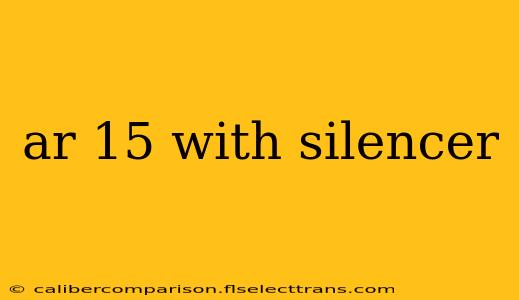The AR-15 platform's versatility is undeniable, and the addition of a suppressor further enhances its capabilities for both recreational shooting and competitive use. This guide delves into the intricacies of using an AR-15 with a silencer, covering legal considerations, performance impacts, and selection advice.
Understanding the Legal Landscape of Suppressors
Before even considering mounting a silencer on your AR-15, it's crucial to understand the legal framework governing their ownership and use. Suppressor laws vary significantly by state and country. In the United States, suppressors are regulated under the National Firearms Act (NFA) of 1934, requiring registration with the Bureau of Alcohol, Tobacco, Firearms and Explosives (ATF) and a thorough background check. Failure to comply with these regulations can result in severe penalties. It's imperative to research and adhere to all applicable federal, state, and local laws before purchasing or using a suppressor.
How a Silencer Impacts AR-15 Performance
While often perceived as completely silencing a firearm, a suppressor doesn't eliminate the sound entirely. Instead, it significantly reduces the perceived noise, typically lowering the decibel level by 20-35 dB. This reduction offers several benefits:
Reduced Recoil:
The back pressure created by the suppressor can slightly reduce felt recoil, improving shooter comfort and accuracy, especially during rapid fire.
Improved Accuracy:
Reduced muzzle blast and flash can lead to improved target acquisition and follow-up shots, enhancing overall accuracy.
Hearing Protection:
The primary advantage of a suppressor is the significant reduction in noise, lessening the need for heavy-duty hearing protection and reducing the risk of hearing damage. However, even with a suppressor, hearing protection is still recommended.
Choosing the Right Suppressor for Your AR-15
The market offers a wide array of suppressors, each with unique characteristics. When selecting a suppressor for your AR-15, consider the following factors:
Caliber Compatibility:
Ensure the suppressor is rated for the caliber of your AR-15. .223/5.56mm suppressors are common, but some are also designed for larger calibers.
Size and Weight:
Larger and heavier suppressors generally offer greater sound reduction but can impact the balance and handling of your rifle.
Material:
Suppressors are typically constructed from stainless steel, titanium, or a combination of materials. Titanium suppressors are lighter but more expensive.
Mounting System:
Most AR-15 suppressors utilize a direct-thread mount or a quick-detach system. Consider the convenience and speed of the mounting system.
Maintenance and Care of Your Suppressor
Proper maintenance is crucial for the longevity and optimal performance of your suppressor. Regular cleaning is essential to remove carbon buildup and other debris. Consult the manufacturer's instructions for specific cleaning procedures and recommended cleaning solvents.
Conclusion
Adding a suppressor to your AR-15 offers several advantages, including reduced noise, recoil, and improved accuracy. However, legal compliance and proper suppressor selection are paramount. Thorough research and adherence to all applicable laws are crucial before integrating a suppressor into your shooting regimen. Remember to consult with firearms experts and always prioritize safety.

